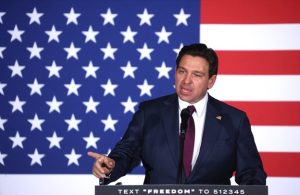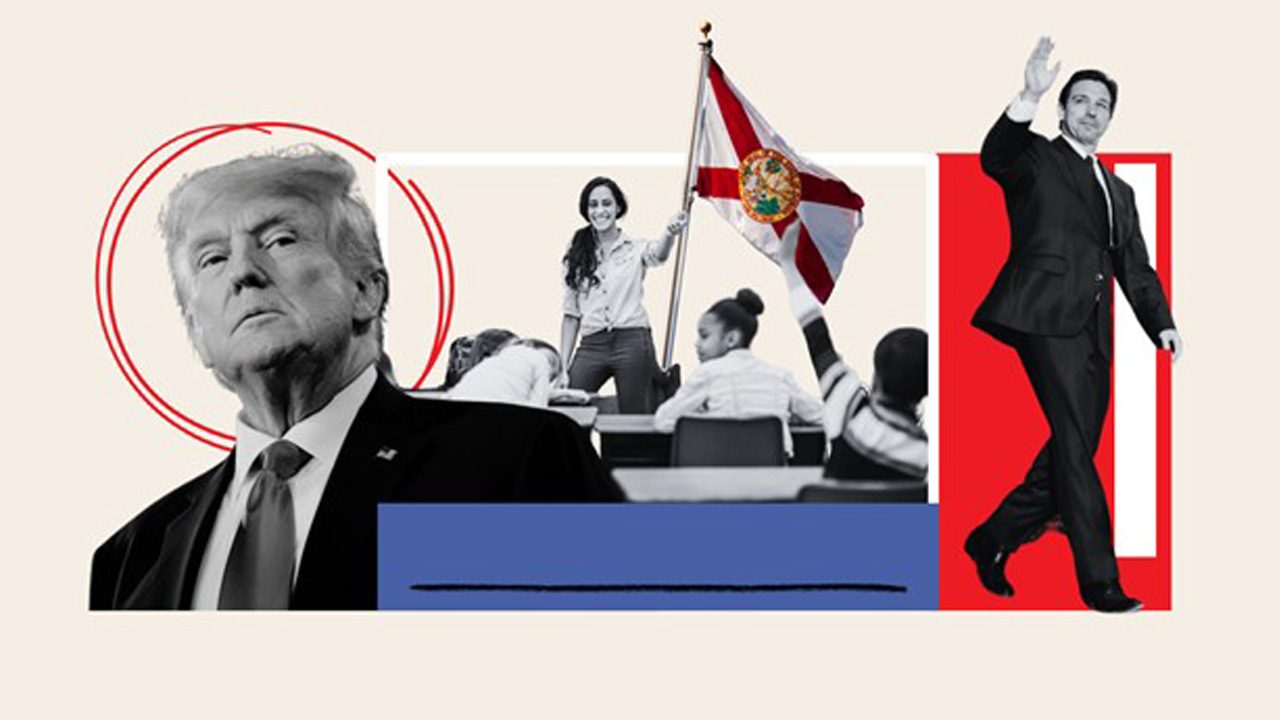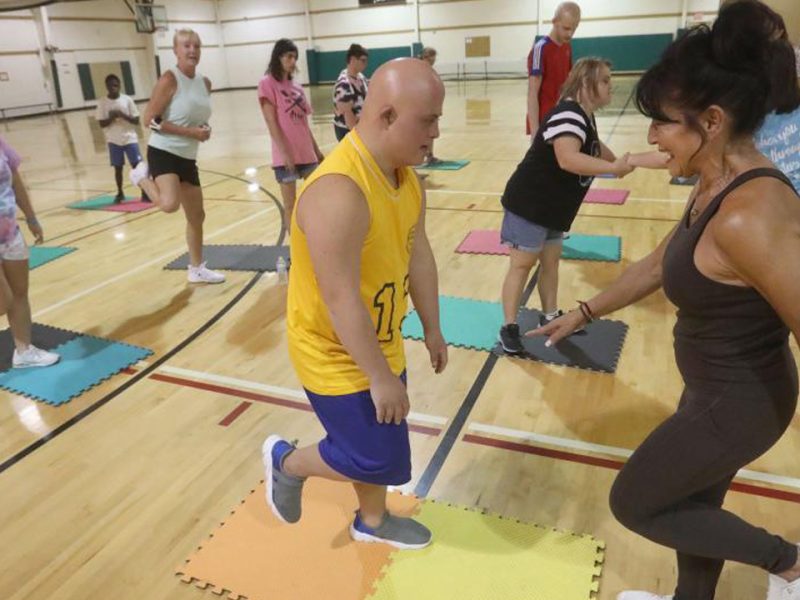In Florida, Trump Sees Model for National Education Policies
Newsweek | By Katherine Fung | November 19, 2024
When Florida Governor Ron DeSantis campaigned, briefly, for the GOP Republican presidential nomination last year, he said he wanted to “Make America Florida.” Though DeSantis may have failed in his primary bid take the Republican crown from Donald Trump, the president-elect might make his dreams come true anyway.
DeSantis, once considered Trump’s most formidable GOP challenger, rose to national prominence after he was endorsed by Trump to lead Trump’s adopted home state six years ago. In 2020, when the Covid pandemic disrupted every facet of American life, DeSantis saw an opportunity to lead the right’s growing frustrations with what conservatives view as unbridled wokeness amid the country’s leftward drift. Once President Biden was elected that fall, DeSantis was well on his way to becoming a cultural crusader, with Florida’s public school system his primary foil.
Now that Trump is headed back to the White House, the president-elect has made clear that he has big plans for education policy. And his model will be based on what DeSantis has been doing from Talahasee.
“[Republicans] always try things in Florida first,” former Education Secretary Arne Duncan told Newsweek. “Florida leads the country in book banning, by far. They’ve tried to politicize the school board candidates there with the Moms for Liberty candidates.” Duncan led the Department of Education for nearly seven years under former President Barack Obama.
In 2022, DeSantis ignited a national firestorm—and public feud with Disney—after signing a Parental Bill of Rights into law. The statute, which was dubbed the “Don’t Say Gay” bill by critics, included a controversial section that prohibited public schools from having “classroom discussion” about sexual orientation or gender identity from kindergarten to third grade.
In the two years since, DeSantis has signed a string of other education bills into law, including legislation allowing parents to challenge books they feel are inappropriate, prohibiting the teaching of systemic racism, sexism or oppression and requiring the instruction of the “dangers of communism.”
The governor has also turned Florida into a haven for school choice, massively expanding voucher programs so that any Florida parent can transfer their children out of traditional public schools into private or charter schools with the funds their local public school would have received if they attended.
As of June, at least 17 other states have imposed bans and restrictions on race and gender identity being taught in K-12 education. At least 9 others have allowed teachers to disregard pronouns requested by students.

Students against the CRT ban make their views known while pro-ban speakers talk during the public comment portion of a meeting of the Placentia-Yorba Linda Unified School Board in Placentia on Wednesday, March 23, 2022.
DeSantis has become the face of education reform in post-Covid America, but almost all of the credit is for Moms for Liberty to take. Born out of the lockdowns and school closures of 2020 and 2021, the Florida-based group was founded by three former school board members who wanted the government to recognize “parental rights.”
“The idea that the government somehow thinks they know better than parents for their children is absolutely ludicrous,” Moms for Liberty co-founder Tiffany Justice told Newsweek. “I’m very proud of the fact that in Florida, we’ve been able to grow a grassroots army able to lead the nation.”
Justice said the group had tried for years to get a “parents’ bill of rights” passed, but that the legislation struggled to garner enough support even with a Republican-controlled state legislature. Then came the coronavirus. As most schools moved to virtual learning, parents suddenly found themselves in their children’s classrooms.
Moms for Liberty found their moment.
“We followed Governor DeSantis all around the state. Our moms made signs that said, ‘Unmask our children,'” Justice said. “We wanted Governor DeSantis to push for the parent’s bill of rights, which was eventually passed… but it really took that groundswell of grassroots support to give the governor and others courage to take a stand on that issue.”
Florida’s education policies, including bans on certain library books and discussion of sexual orientation and gender ideology, are used as a model for all of Moms of Liberty chapters, Justice said.

Former U.S. President Donald Trump (L) and Co-founder of Moms for Liberty Tiffany Justice (R) share a moment during the 2024 Joyful Warriors National Summit on August 30, 2024 in Washington, D.C.
There is no doubt that the work of her group, which has expanded to 300 chapters across 48 states, has put Florida at the forefront of the parental rights conversation.
Zander Moricz, the 20-year-old founder and executive director of the Social Equity through Education (SEE Alliance), told Newsweek there’s a variety reasons that his home state has become “a battleground for education policy,” but that pivotal to DeSantis’ success in reforming Florida’s school system is the relationship he built with groups like Moms for Liberty, ties that built a “local coalition that could enact the ideology from small bases up into a large message.”
“The local strategy, the school board strategy that DeSantis worked on and employed, is why Florida is such a controversial place for our culture wars and for our public-school policy,” Moricz said.
In 2022, DeSantis endorsed 34 conservative school board candidates in a bid to grow the GOP’s local education allies. When 29 of those candidates won, conservatives cheered. But 2024 was less kind to the governor. He endorsed 23 school board candidates this year, 11 of whom lost their races. Candidates endorsed by Florida Democrats, on the other hand, won 7 of 11 races that they ran in.
“Of course, we want parents more involved in the education of their children,” Nikki Fried, the chair of the Florida Democratic Party, told Newsweek. “That is always the goal of a healthy education system—the involvement of family. But what has happened is giving power to one group of parents over everybody else, whether it’s Moms for Liberty’s platform which has gotten into the school boards, which has made school board meetings very controversial, very erratic, filled with chaos.”
“We have a lot of parents that are concerned that they may not be able to stay in traditional public schools, because the funding is being depleted, teachers are leaving,” Fried said.
As school choice programs ballooned in Florida, public school enrollment has steeply declined. Since the 2019-2020 school year, some 53,000 students have left traditional public schools. Broward County, the state’s second-largest school district, has lost more than 20,000 students. Now, officials are planning to close up to 42 campuses over the next few years.

Florida Governor Ron DeSantis speaks at his caucus night event on January 15, 2024 in West Des Moines, Iowa. DeSantis, who ran for the GOP nomination this year, built a national profile on his education.
School choice opponents have warned that such programs hurt already chronically underfunded public schools by diverting much-needed tax dollars from the school systems.
In Texas, where Republican Governor Greg Abbott has made school choice a top priority, there has been pushback from state Republicans who represent rural districts where communities rely on public schools as a lifeline. Abbott successfully ousted enough of his GOP holdouts during this year’s primaries, replacing them with more school choice-friendly Republicans, and is expected to pass the legislation next year.
In a statement sent to Newsweek, Florida’s Department of Education defended its policies, noting that the state has been ranked as #1 in education for the last two years and #1 in higher education eight years in a row by U.S. News and World Report, which determines ratings by weighing multiple categories.
WalletHub ranked Massachusetts as the #1 “most educated” state in 2024 based on education attainment and quality of education. Florida is 21 on WalletHub’s list.
“Florida has been a national leader in quality education under the leadership of Governor DeSantis and many other states have followed the Florida blueprint in expanding school choice, eliminating DEI and CRT from classrooms and supporting parents’ rights,” Sydney Booker, the communication directors for Florida Department of Education, told Newsweek.
“The Florida Department of Education looks forward to working with the Trump Administration to continue to build on Florida’s success,” Booker added.

Students return to school at Seminole Heights Elementary School after the Florida Department of Education mandated that all schools must have in-class learning during the week on August 31, 2020 in Tampa, Florida.
What Is Trump’s Education Plan?
On the campaign trail, Trump repeatedly promised to “close” the U.S. Department of Education and “move education” back to the states. Education policy is largely controlled by state and local governments, although the DOE disburses federal funds to supplement those resources and fund programs, many of which are for low-income, at-risk or special education students.
The president-elect has also said he wants to cut funding for any school teaching critical race theory or “transgender insanity,” implement a nationwide school choice program, credential teachers who “embrace patriotic values and support the American way of life” and adopt merit pay for educators.
Justice, the Moms for Liberty leader, appeared alongside Trump on the campaign trail and has been floated as his potential Education Secretary. She said parents should be “thrilled” to have Trump back in the White House “because he puts parents back in the driver’s seat when it comes to their children’s education and the upbringing of their children.”
“President-elect Trump has been very, very clear about the fact that he knows he has a mandate from the American people for school choice,” Justice said. “There are a lot of people that voted for him because they want to have the freedom to send their child to the school of their choosing. He’s been very clear that that’s something that he wants to do, and I have no doubt whoever he hires as the secretary of education is going to make sure that comes to fruition.”
But others in Florida are issuing a warning to the rest of the country.
“[DeSantis] and the government of [his] administration of Florida… is trying to destroy public education, and now the national Republican Party seems to want to do the same thing,” Crystal Etienne, a teacher in Miami-Dade County and the president of the Democratic Public Education Caucus of Florida, told Newsweek.
Newsweek reached out to DeSantis for comment.
While some parents, like Justice, are hoping for the national school choice program to become a reality, Etienne called it her “biggest fear.” She also argued that the reason DeSantis has been able to usher in so many changes is because the choice of education policy “hasn’t been given to the people in Florida.”
“When you leave it to the people—we saw other states just this past election cycle that were able to defeat school choice,” Etienne said. “In Florida, it’s not people making the decision. Florida is ruled by the governor and his far-right sycophants who are willing to do this.”
In November, voters in Colorado, Nebraska and Kentucky all rejected ballot initiatives aimed at expanding school choice.

Zander Moricz attends Queerty Celebrates Pride50 Gala 2024 at The Edison Ballroom on June 17, 2024 in New York City. Moricz has become a vocal student critic of DeSantis and one of Florida’s most prominent.
Moricz, who went viral in 2021 for a speech he delivered at his high school graduation in Osprey, Florida, said: “We’ve made the mistake here in Florida so that the rest of the country doesn’t have to. We’ve learned the lesson the hard way so that the country doesn’t have to.”
“If Donald Trump really does decide to eradicate the Department of Education, it’s going to be our students that feel the impact first,” he said. “It’s going to be our students who feel what’s actually happening. So, we’re going to need to be prepared to listen to them and respond to what they’re telling us in a large, organized fashion.”
Students’ Response to Conservative Education Policies
As the youngest plaintiff in a lawsuit challenging the state’s Parental Rights Bill, Moricz has become a vocal student critic of DeSantis and one of Florida’s most prominent student activists. He has been invited to speak at the DOE, met President Biden at the White House and led tens of thousands of students across Florida in a walkout against the governor’s education policies.
This year, Moricz helped organize against a GOP-backed ballot initative to make school boards partisan. But Amendment 1, despite having majority support, failed to clear the 60 percent threshold needed to be approved. The “No On One” campaign reached 7 million voters in the final three weeks and led to a huge youth turnout, Moricz said.
“The vast majority of students want public schools to be strengthened. They want to be able to read what they’d like to read. They want to be able to show up to classrooms as themselves, and they want freedom in our public school system,” he said. “What DeSantis has been preaching and what DeSantis policies push forward is the antithesis of freedom.”
Moricz said he doesn’t blame parents for supporting DeSantis, arguing that the governor leveraged pandemic-induced fears and created a “toxic culture” where parents were being inundated with the idea that their children were constantly “in danger.”
“The majority of families that are acting on these lies are not doing so in bad faith. They’re doing so because they believe it’s what’s best for their families, and they’re listening to the people they’re supposed to be,” he said.
Could Trump ‘Make America Florida’?
Florida’s conservative laboratory could offer a playbook for Trump to take the state’s education policies nationwide, but Paul Reville, Massachusetts’ former Secretary of Education, told Newsweek it would be unlikely that those laws could be applied sweepingly by the federal government.
“The states have the prerogative to do a lot of curriculum control and book control and things of that nature. The federal government doesn’t really have any prerogatives as far as that goes,” Reville said.
Ultimately, he said, it would be up to the states, who are already responsible for the education of its students.

Florida Gov. Ron DeSantis gives remarks at the Heritage Foundation’s 50th Anniversary Leadership Summit at the Gaylord National Resort & Convention Center on April 21, 2023 in National Harbor, Maryland.
“Some of the states have taken extreme measures that align with the culture wars. They’ll feel reinforced by a federal administration that is supportive of that kind of policy and creates some incentives for [states] to double down on some of those kinds of things. But they won’t do it unless there’s an inclination in the state to do it,” Reville said.
“There are a number of red states, but those red states already have many of these measures that we’re talking about,” he added. “Florida already has what it has, and parents are adjusting to it, or they’re picking up and leaving and going elsewhere for their children’s education.”
But Fried, the state’s Democratic party chair, wasn’t as convinced.
“Even if there aren’t many direct resources that come from the Department of Education to our states—he can certainly dangle other types of federal dollars out there, only to them pull back,” she said.
“He has other levers to pull, if he so chooses to really be hell bent on upending the public education system of this country.”






